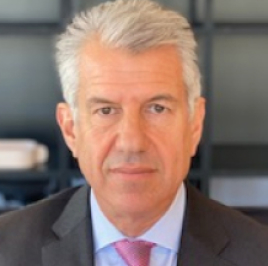Development Finance
Institution
Development Goals

What we do
The J.P. Morgan Development Finance Institution (JPM DFI) was established in January 2020 to mobilize finance in support of the UN Sustainable Development Goals (SDGs) in emerging economies. The JPM DFI seeks to expand J.P. Morgan’s sustainable development-oriented financing activities by i) applying its impact methodology to assess the anticipated impact of transactions; ii) originating and structuring sustainable development finance transactions; and iii) identifying sources of capital interested in financing opportunities with measurable development impact. By supporting the origination and distribution of financial products to institutional investors, acting as investors or lenders, who are interested in financing sustainable development, the JPM DFI aims to build sustainable development as a traded asset class.
Annual reports
What we offer
The JPM DFI applies its impact methodology to assess transactions with public and private sector clients and official development institutions (ODIs) that may promote economic and social/sustainable development in countries eligible to borrow from the World Bank. In particular, the JPM DFI offering includes:
Using the JPM DFI methodology to assess the anticipated development impact of transactions and assist clients in communicating the expected contributions of their transactions towards advancing the UN SDGs.
Creating scalable financing structures with the goal of catalyzing investment from both private and public sector investors.
Identifying sources of capital that seek investments with both financial returns and sustainable development impact.
Our clients
sovereigns
As Development Finance Structuring Agent (DFSA), we assist corporate and sovereign clients in preparing disclosures of the anticipated development impact of their intended projects or activities in emerging markets. We provide a development impact assessment, a report that applies our methodology to the transaction, produces an intensity score, and provides a framework for reporting on the impact of the transaction over its time.
The JPM DFI assists investors to identify investment opportunities in transactions with anticipated contributions to the UN SDGs.
The JPM DFI collaborates with ODIs (such as national and multilateral development banks) on transactions with sustainable development impact. For example, J.P. Morgan may serve as a bond underwriter for the ODIs and may work with DFIs that act as an anchor investor in a transaction.
Insights
Unpacked: Development Finance
Learn how development finance plays an important role in funding sustainable projects, like clean water, in emerging markets, and why there’s a push for private institutions to play a more active role in having an impact.
Unpacked: Development Finance
Learn how development finance plays an important role in funding sustainable projects, like clean water, in emerging markets, and why there’s a push for private institutions to play a more active role in having an impact.
Affordable and clean energy, widespread access to healthcare and education, quality jobs and infrastructure, safe and sustainable cities. These are pretty ambitious goals for developing countries, so how can we get there? By raising about an extra 2.5 trillion dollars of annual financing until the year 2030.
This is: Development Finance Unpacked
Back in 1944, the concept of development finance was born. Institutions like the World Bank were created to fund the rebuilding of vital infrastructure and services across efforts of war-torn European countries.
Since then, development finance has evolved into what it is today: Funding projects that improve the quality of life and well-being of people in developing countries.
In September 2000, a critical milestone took place when all United Nations members agreed on a set of development goals to achieve by 2015 called the “Millennium Development Goals.”
The idea? To rally world leaders around efforts to fight extreme poverty, expand access to quality jobs and healthcare, and more.
As 2015 approached, the United Nations formed 17 new Sustainable Development Goals to be achieved by 2030. They aimed to advance progress on things like: clean water, infrastructure, education, sustainable farming, improved mobility, and more.
Sustainability is the connecting force between them, emphasizing the necessary balance between economic growth, social inclusion, and environmental protection.
The estimated total investment needed to achieve the SDGs in emerging economies ranges between 3.3 to 4.5 trillion dollars per year.
Currently, we’re only half way there. According to the United Nations, there is a 2.5 trillion dollar gap of development finance – per year – until 2030.
Historically, the development financing has primarily come from public institutions, which are owned and operated by government shareholders.
It can also come from multilateral institutions, like the World Bank. They receive funding from multiple member governments and use it across projects in developing countries. Currently, around one hundred and forty countries are eligible to borrow from the World Bank.
However, this annual funding gap can’t be closed by public institutions alone. To do it the private sector – think multinational corporations or financial institutions – must play a leading role.
Private organizations can offer more capital, access to investors, structuring expertise and a global network.
It could be a direct investment like opening a factory, or a portfolio investment, like an asset manager buying a bond from a government to provide clean water.
Let’s look at an example of how development finance works. Let’s say a government agency in Saharan Africa, to build new infrastructure to provide clean water. While this may intuitively feel “developmental”, a development finance institution will thoroughly evaluate whether this qualifies as a development finance opportunity.
Certain questions could include: Will the infrastructure serve areas that struggle to access clean water? Will it be resilient to climate change? Does the agency provide quality jobs and training to employees?
If a project meets the necessary requirements, the development finance institution will connect this opportunity with potential investors – usually those interested in supporting development finance activities, like an impact investor or an ESG investment fund manager.
From there, projects that support the SDGs and have impact in developing countries, receive their needed funding and we move one step closer to closing that 2.5 trillion annual dollar gap.
[MUSIC PLAYING]
Introducing the Impact Disclosure Taskforce at COP28
Arsalan Mahtafar: The good news is that the volume of capital managed by sustainable investors that are seeking sustainable outcomes are continuing to grow. But at the same time, achieving the sustainable development goals and financing the sustainable development goals still remain out of reach.
So this panel will unpack this problem and introduce the Impact Disclosure Task Force, an initiative launched by a network of financial institutions to leverage the principles of impact measurement and monitoring to direct sustainable capital to where it's needed most.
John Murton: There is finance flowing towards sustainable finance, but it's primarily flowing to climate-related goals, and it's primarily flowing to developed markets, rather than emerging markets. It's much easier, for a range of reasons, to finance a solar power plant in France than it is in India, which is unfortunate, in climate terms, because the solar power plant in India will displace much more carbon than the solar power plant in France.
It's much easier to finance a solar power plant in India than it is to finance a social development project. Part of that is due to the data that's available. It's much easier to prove the impact in, say, emissions avoided for a solar power plant than it is for a water project that might serve a rural community in a developing market.
So as a result, with the lack of data, it's difficult to bring capital in. It's difficult to bring investment in to maybe where it's required most. And it's only by scaling that private sector investment, not just in solar plants in India, but in water projects, in projects to conserve biodiversity, that we're going to deliver on the development goals.
Adam Mariko: The SDG gap is quite huge. And I think the problem should not be just to call for more money. It's to change the financial system to reorient the existing money somehow to SDGs finance and sustainable finance.
John Murton: It's a network of public and private financial institutions, and capital market participants, and industry stakeholders. And what they're doing is they're drafting voluntary guidance for entity-level disclosure, so disclosure at a corporate entity level, about impact and giving us mechanisms to facilitate impact reporting across an entity and data provision so that we can then deliver financing against that.
What it will do is it will deliver, hopefully, forward-looking targets that address development gaps. So a company, an entity will develop forward-looking targets that address development gaps and are specific to their context and the markets that they operate in, which means they're going to be different in Bangladesh than in Bolivia or in Brussels. And that's really important.
And they will establish mechanisms to disseminate and analyze that entity-level impact information into digestible bites so that it will foster accountability and transparency so that investors and people considering investments will be able to understand that information and invest on the basis of it. And that gives financial institutions and decision-makers more capacity to identify where their finance, where their money will have a real impact and allocate accordingly.
Bertrand Millot: There's four things that we would look at. We would look at trying to identify intentions. Impact-- the difference between the two is intentions. It's really, really important to understand that. What are we trying to change in the world? And obviously, it has to be looked at in the context of what the problems are related to your industry or the place where you're doing business.
And then you think, OK, well, set targets. How am I going to change that? And then make sure that, obviously, you measure it, and you disclose what you intend to do, and you look at progress going forward. So that's really the difference between the two.
Ayla Bajwa: We're an end-to-end logistics solution provider. And so one of our key pillars is-- or key verticals are ports, as mentioned earlier, so ports and terminals. And so the port and terminal space is interesting because your customer is often a government. And so governments ask you, what are you going to do for my country?
And so when that becomes the question, you no longer are a project investor, as mentioned while talking about the impact disclosure framework. You're an ecosystem investor. And so when you're an ecosystem investor, you're not looking at just the asset.
You're looking at, yes, spillage, waste management, and all the rest of it, but you're also looking at coastal systems. You're looking at people positive. You're looking at nature positive. You're really looking at the full gamut. And so, today, as DP World, we are-- so I think one good example of a market that we've done this well is Berbera. So, in fact, we have a documentary that was released just a couple of hours ago that we've done with The Wall Street Journal, but it really brings what we do to life, which is we look at employment. We look at the needs of the country from an education point of view, from a from a water access point of view, and so all of it guided by something we call the "our world, our future" strategy.
And so the "our world, our future" strategy is our sustainability strategy. But if you look at the framework, it has business priorities. So we have identified business priorities and community contributions-- what we call community investment-- because we're there for the long run.
So often, the investors or other stakeholders are nervous because they need short-term return. And as DP World, we're in it for the long haul. We get it. You're going to go into the Global South? It's going to take time.
And so what actually has been positive to see-- and Berbera continues to be a good example for it-- is because we had faith in Berbera, and we invested in Berbera, and we looked at the poor-- the economic zone, the water access, the education, all of it looking, now at coral and reef restoration, the full situation, now we see other entities having the confidence to invest in Berbera.
Erin Leonard: The good news is that we do see very strong growth in sustainable investment. You may not read about that in the newspapers every day, but our own sustainable investments have grown from 1%, I think just three to four years ago, to about 10% of our total assets. So it's increasingly in focus for us.
And as part of our mission-- obviously, we're investing for returns. We're investing for our investors. But we do want to create products that are supporting the emerging economies and that are facilitating the flow of capital to the projects and the businesses that really need the money. So that's the part that makes me enjoy my job the most, I would like to say.
But back to complexity, we manage money across, I think, 12 different locations currently. We hold over 30,000 securities. So access to information and data is absolutely one of our biggest challenges.
And so initiatives like this that are going to facilitate the provision of information are absolutely critical to our day-to-day activities. And so we want to see this type of activity really take hold and become widely accepted through the industry.
I mean, it's as simple as the fact that, if we can't get sustainability information on an issuer, we are not going to invest because we just don't have the transparency. So it really is tied directly to the flow of capital.
Adam Mariko: We were very proud, in AFD, to join the task force and this discussion because, if private sector goes in this discussion alone, building norms in their own will, I think there is a faith and will to do it, but no one will believe it, somehow, because there is always this risk on saying, OK, where is the catch?
That's why, also, the public development banks and all the work and the data we are accumulating is useful to put it in the public good. And that's why AFD have pushed, also, to be there. At some point, mobilizing private capital is not just at the project level. Even the funding that we are using-- I come from the finance business of the of the bank. We issue 10 billion euro bonds every year.
And our goal is, within two years, to certify all our balance sheet SDG-aligned, which, I hope, will avoid us to justify every bonds with the reporting that goes with it. At some point, the investor should understand that investing in this balance sheet has incentive for them, and it's an aligned investment they are doing, which means we should have clear norms and data on all those perspectives.
Erin Leonard: Our approach is that we would much rather engage with companies than divest. We want to work with companies to understand their practices, understand their challenges. We like to think that we can also help companies with their transition plans by maybe giving information on other practices that we see going on in the marketplace. So with information, we're better empowered to engage.
Bertrand Millot: By pushing companies to do the right thing is how things are going to change. We can't do it ourselves. We invest in companies. And so it is a very, very important aspect.
There's different ways to do it, depending on which kind of company you invest in. You should-- you have the obligation to actually vote on the annual general meeting. And for example, if you take climate as an example, we have a well-articulated strategy to engage the company to discuss with them what they're up to, and then if we're not happy, to potentially raise that to a more senior level, chair of the board.
If we continue not to be happy, we can actually submit a shareholder proposal in a formal process, which will then be subject to a vote. And then, in the end, there is always the option of voting against the board directors who are in charge of sustainability, for example.
Ayla Bajwa: Today, a lot of our investment that we're talking about and that will feed into these impact metrics is because we have a multi-stakeholder engagement approach. But I will tell you, if we had a tunnel-vision investor approach, we would not be incentivized today to be investing in education, or water, or any of this. So help us out. We really want to. But if you don't hold us to task, then it's going to be difficult for us to get it over the line internally.
Erin Leonard: Very important, but I think we also have to recognize that, in the emerging markets, adding extra layers of cost associated with verification schemes is a big ask. And the way that we, as asset managers, look at it-- of course, if we've got a third-party verification, that makes our lives easier, cleaner. We can probably do a little bit less homework ourselves.
But we do also value self-certification with companies that have the good governance, that have proper risk management frameworks and assurance frameworks, et cetera. And I believe I'm right about this-- that even MSCI, in terms of the data that they bring in, they actually will reference where data coming in is third-party-verified or self-assured.
Those factor into our scoring models. So again, higher score if you have third-party verification, but your company will be considered if it is self-assured.
[END]
Impact Disclosure Taskforce: Advancing the UN SDGs
How can sustainable finance make a global impact?
JPM DFI: Catalyzing sustainable developments
Mobilizing private capital toward sustainable development
Deals and
transactions
Learn about the deals the DFI team has led and the impact they are having in advancing and supporting emerging markets.
Improving connectivity across Africa
J.P. Morgan acted as joint global coordinator, joint bookrunner and DFSA for AXIAN Telecom’s debut $420 million five-year bond in February 2022. AXIAN Telecom operates across Africa and is a leading provider of telecommunications, mobile money services and digital infrastructure. The transaction is expected to bolster the company’s operations in Tanzania, Togo and Uganda and to improve telecom connectivity in Africa.
Supporting trade expansion in Latin America
In February 2022, J.P. Morgan acted as mandated lead arranger, sole structuring agent and DFSA for Yilport Holding’s $127 million ECA-covered loan for the expansion and modernization of the Puerto Bolívar Port terminal in Ecuador. Upon completion, the port is expected to become the largest container terminal on the Pacific Coast of Latin America, enabling the country to increase and diversify its exports.
Funding a large-scale infrastructure project in Brazil
In August 2022, J.P. Morgan acted as the guarantee issuer and DFSA for Acciona's syndicated letter of credit to fund the construction of São Paulo Metro Line 6, the largest public-private infrastructure project (in terms of funding) in Latin America. Upon completion, the São Paulo Metro Line 6 is anticipated to have a capacity of over 600,000 passengers a day, which will improve mobility for the 260,000 inhabitants of Brasilândia, a low-income neighborhood. The Brazilian Development Bank provided 6.9 billion BRL ($1.3 billion) with J.P. Morgan guaranteeing 283 million BRL ($54 million).
Helping LATAM Airlines rebuild
J.P. Morgan acted as lead left bookrunner and DFSA for LATAM Airlines' $1.15 billion dual-tranche bond offering and joint lead arranger, joint bookrunner and DFSA for the company's $1.1 billion Term B loan in October 2022. The financing supports LATAM Airlines in emerging from Chapter 11 bankruptcy and is anticipated to help improve its route network and climate change mitigation efforts.
Financing solar projects in India
J.P. Morgan issued a green standby letter of credit of 1.05 billion Indian Rupees ($13.2 million) and acted as DFSA for ReNew's power purchase agreement (PPA) with Amazon in October 2022. ReNew is constructing a 210-megawatt solar power project in India under a long-term PPA with Amazon's energy trading entity. The project supports Amazon's global objective of powering its operations with 100% renewable energy by 2025.
Contacts

Executive Director
Head of JPM DFI
+1 (212) 270 8088

Vice President
+1 (212) 622 3185

Associate
+1 (212) 622 3104
Frequently asked
questions
The JPM DFI augments JPM’s existing emerging markets client offering by addressing the growing demand from institutional investors for transactions with credible impact disclosure and reporting. By applying the JPM DFI impact methodology, we help our emerging markets clients assess the anticipated development impact of their transaction and communicate that impact in a standard format to the investor community. Through increased investor engagement, we hope to create a “virtuous cycle”, whereby more emerging markets issuers recognise the benefit of setting clear sustainable development targets which can be measured and tracked. This improved disclosure from emerging markets clients should further support investor confidence and capital flows into sustainable development assets in emerging markets.
The JPM DFI does not have its own balance sheet capacity. The JPM DFI provides its services in conjunction with J.P. Morgan’s Corporate & Investment Banking (CIB) products. The CIB, among other things, originates and structures financial instruments for distribution/syndication to the ultimate institutional investors to such assets. The JPM DFI helps emerging markets corporates and sovereigns assess the anticipated development impact of their financing needs and identify institutional investors seeking to provide capital or risk mitigation products to projects and transactions with sustainable development impact. In doing so, the JPM DFI seeks to scale up the CIB’s origination of such transactions and accelerate the mobilization of capital to these investment opportunities.
In recent years, we have seen a growing interest in ESG and impact investing from all market participants. As the ESG wave grows, we have observed meaningful changes in behavior and increased interest in ESG products from investors (ESG-aligned funds), corporates (focus on ESG frameworks and targets) and commercial banks (public commitments). J.P. Morgan has also advanced its ESG strategy by forming new teams focused on climate change and sustainable development, and by announcing a $2.5 trillion target by 2030 to finance and facilitate transactions that address climate change and contribute to sustainable development. In 2021, transactions assessed by the JPM DFI accounted for the largest contribution to this target.
The UN Sustainable Development Goals (SDGs) are at the heart of the 2030 Agenda for Sustainable Development, adopted by all United Nations Member States in 2015. The SDGs are 17 interconnected global goals and 169 unique targets aimed at ending poverty, improving health and education, reducing inequality, and spurring economic growth – all while tackling climate change and working to preserve our natural ecosystems. While some of the goals (e.g., SDG 7 Affordable and Clean Energy and SDG 13 Climate Action) are directly aimed at mitigating the adverse impacts of climate change, a focus on economic, social, and environmental sustainability is a common feature underlying all of the SDGs.
This material (including market commentary, market data, observations or the like) has been prepared by personnel in the Development Finance Institution at JPMorgan Chase & Co. It is not the product of any Research Department at J.P. Morgan (“JPM Research”) and has not been reviewed, endorsed or otherwise approved by J.P. Morgan Research. Any views or opinions expressed herein are solely those of the individual authors and may differ from the views and opinions expressed by other departments or divisions of J.P. Morgan. This material is for the general information of our clients only and it is not intended as an offer or solicitation for the purchase or sale of any financial instrument or as an official confirmation of any transaction or a recommendation for any investment product or strategy. All transactions (including potential transactions) presented herein are for illustration purposes only.
Information has been obtained from sources believed to be reliable but J.P. Morgan does not warrant its completeness or accuracy. In no event shall J.P. Morgan be liable for any use by any party of, for any decision made or action taken by any party in reliance upon, or for any inaccuracies or errors in, or omissions from, the information contained herein and such information may not be relied upon by you in evaluating the merits of participating in any transaction. J.P. Morgan is not obligated to update any information contained herein or to inform you if any of this information should change in the future. The information contained herein does not constitute a commitment or undertaking by any J.P. Morgan entity to underwrite, subscribe for or place any securities or to extend or arrange credit or to provide any other services to any person or entity. All products and services are subject to applicable laws, regulations, and applicable approvals and notifications. J.P. Morgan is the marketing name for the investment banking activities of JPMorgan Chase Bank, N.A., J.P. Morgan Securities LLC (member, NYSE), J.P. Morgan Securities plc (authorised by the PRA and regulated by the FCA and the PRA) and their investment banking affiliates.
RESTRICTED DISTRIBUTION: This material and statements made herein are proprietary and confidential to J.P. Morgan and are for your personal use only and are not intended to be legally binding. Any distribution, copy, reprints and/or forward to others is strictly prohibited.
© JPMorgan Chase & Co.










